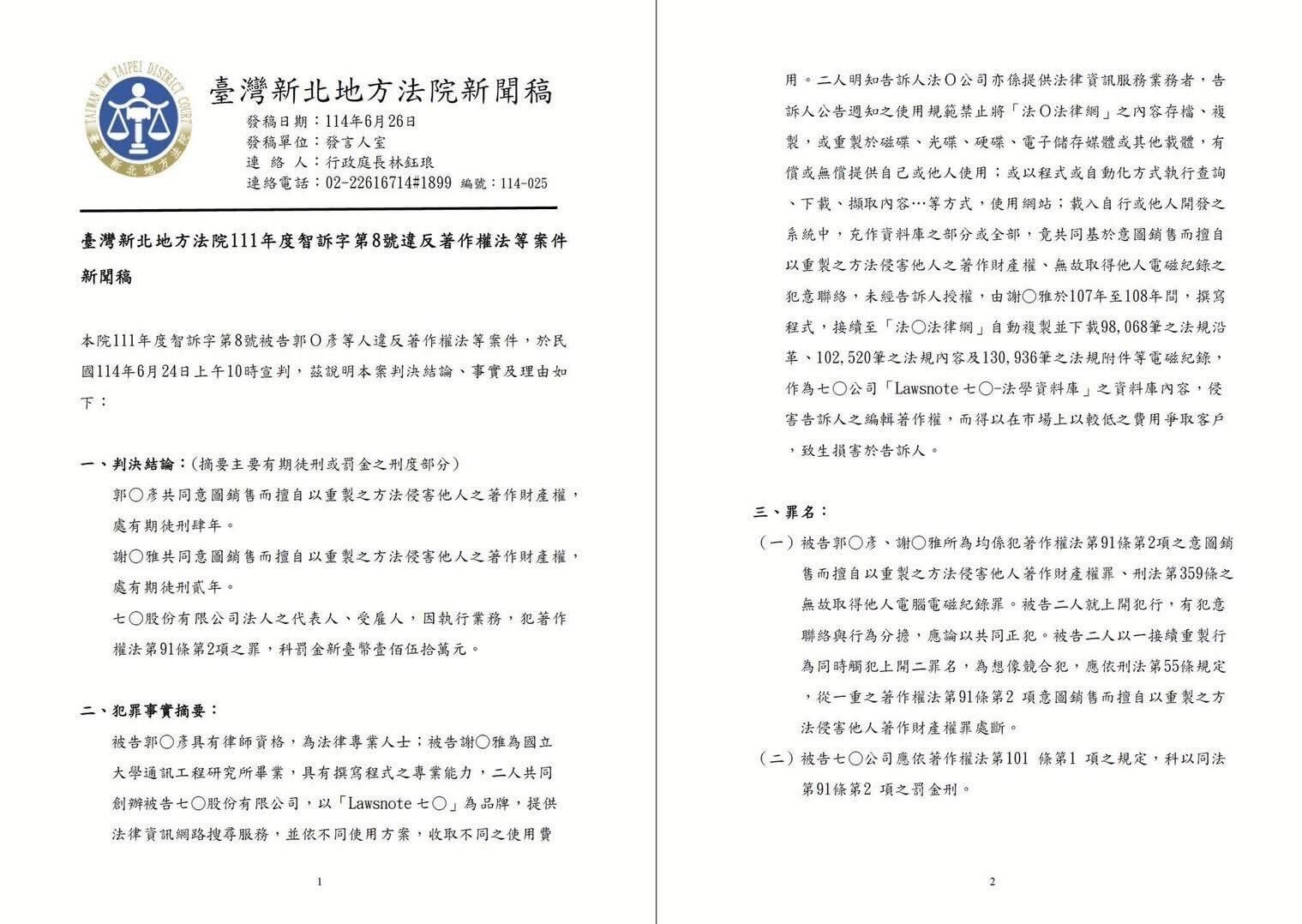
International Comparison of AI Copyright Disputes: Taiwan's Legal Framework and Innovation Gap from the Lawsnote Case
Loading...
Support LAWSNOTE — Unite for Legal Tech

1. The Lawsnote Case: Taiwan’s Dual Criminal and Civil High-Intensity Protection
| Key Points | Ruling Implications |
|---|---|
| Dispute | Using web scraping to massively copy the “Legal Source Network” database with manual formatting and indexing |
| Legal Basis | Copyright Law “Compilation Copyright” (creative selection, organization, formatting) and Criminal Code Article 359 (electromagnetic record theft) |
| Outcome | Two founders sentenced to 4 years and 2 years imprisonment respectively, with joint civil damages of 100 million NTD |

The judge specifically noted that “public data does not equal free use,” and any creative compilation is protected.
Analysis
-
Rare Criminalization Level: Major AI powers (US, Japan, Singapore, UK) mostly handle data extraction disputes through civil infringement; Taiwan directly imposes imprisonment and high fines, with deterrent effects far exceeding international mainstream practices.
-
Lack of AI/TDM Exceptions: Except for limited educational and library situations, Taiwan’s law has no clear exceptions for “machine learning, research, or data mining,” making it difficult for enterprises to obtain compliance pathways.
TDM (Text and Data Mining) refers to the process of using automated techniques to extract, analyze, and discover patterns or information from large amounts of text or data.
2. International Comparison: Most Jurisdictions Tend Toward “Limited Openness + Transparent Accountability”
2.1 United States: Courts Measure Fair Use by “Transformative” Nature
-
Anthropic Case: Judge Alsup ruled that using legally purchased books for model training constitutes fair use, but left the question of whether “long-term storage of 7 million pirated books” constitutes infringement to jury determination.
-
Meta Case: Another federal judge ruled insufficient evidence for plaintiffs, maintaining the fair use status of training activities, but cautioned that “it may still be illegal in many circumstances.”
→ Key Point: The US still primarily uses civil litigation, emphasizing transformative nature and market substitution, without resorting to criminal penalties.
2.2 Japan: Established “Article 30-4” Broad TDM Exception Since 2018
Allows free extraction of protected works during the “information analysis” phase to accelerate AI development; the 2024 draft further distinguishes between “analysis vs. entertainment” and requires avoiding large-scale pirated sources.
2.3 Singapore: 2021 Legislative Amendment, Introducing Section 243/244 “Computational Data Analysis” Exception
Provides AI enterprises with clear, predictable legal windows, with the premise of having “legally obtained” sources, using only for analysis, and limiting redistribution.
2.4 European Union: DSM Directive Article 3 & 4 Two-Tier TDM Exception
-
Research Exception: Free use for research institutions.
-
Commercial Exception: Open in principle, but rights holders can exclude through “machine-readable opt-out.”
Although more conservative, it does not establish criminal liability and emphasizes resolution through licensing markets.
2.5 United Kingdom: 2024-25 Continuous Consultation, Planning “TDM Exception with Opt-out + Transparency Obligations”
Government documents explicitly state that unclear laws will “inhibit AI investment and adoption,” therefore requiring balance between rights holder compensation and open training.
3. Taiwan’s Legal Framework and Innovation Policy Gap
| Indicator | Taiwan’s Current Status | International Trends | Risks / Opportunities |
|---|---|---|---|
| Legal Flexibility | No TDM exceptions, only scattered fair use provisions; compilation databases highly protected and subject to criminal penalties | US, Japan, Singapore, UK all establish clear exceptions or broad fair use; mostly civil damages | Enterprises face “high licensing costs + criminal risks,” likely to abandon training in Taiwan |
| Industry Sandbox | AI sandbox still under inter-ministerial discussion; “AI Basic Law” stalled due to political deadlock | Many countries rapidly iterate through legislation or administrative guidance | Startups struggle to obtain testing environments, leading to capital and talent outflow |
| Data Accessibility | Government open data adopts TODL licensing (more friendly), but private sector value-added data lacks mandatory “friendly licensing” mechanisms | Some countries encourage “open licensing + technical blocking opt-out” dual-track | Legislative gaps easily lead to “one lawsuit kills all” chilling effects |
| Enforcement Methods | Criminal + civil dual-track, heavy penalties for deterrence | Primarily civil, supplemented by administrative regulation (transparency, contracts, labeling) | Over-deterrence → suppresses legitimate innovation, but doesn’t necessarily increase rights holder benefits |
4. Conclusions and Policy Recommendations
-
Not “Deviation” but “Gap”: Taiwan’s approach to protecting compilation databases is similar to the EU, not an international island; but the lack of AI/TDM exceptions and innovation sandboxes makes criminal penalties the only bargaining chip, creating a “high protection, low innovation” imbalance.
-
Short-term
-
Add TDM Fair Use/Chapter: Can reference Singapore’s provisions, requiring “legal acquisition + analysis only + secure storage.”
-
Database Licensing Transparency: Introduce “marking-machine-readable” opt-out mechanisms, balancing rights holder choices.
-
-
Medium to Long-term
-
Promote “AI Basic Law” or Data Governance Special Law, establishing “safe harbor + compulsory licensing + public interest exceptions” and clearly defining criminal-civil proportionality principles.
-
Establish Public-Private Partnership Data Sandbox: Government can release legal sources, court public data APIs, and assist private sector legal licensing through subsidies or co-creation models.
-
Strengthen Competition Law and Open Principles: Avoid individual database monopolies limiting innovation while ensuring investment recovery mechanisms.
-
Overall Assessment: If Taiwan continues to handle data scraping disputes with high criminal penalties, it will be difficult to attract AI model training and data industry investment; if TDM exceptions and transparent licensing mechanisms can be quickly supplemented, it will neither sacrifice rights holder interests nor reduce innovation resistance, aligning with the “open but controlled” strategies of the US, Japan, Singapore, UK, and other countries.
References:
- Lawsnote Founders Sentenced: Taiwan’s First “Web Scraping + AI” Copyright Case
- Mixed Decision in Anthropic AI Case
- Meta Wins AI Copyright Lawsuit
- Japan’s New Draft Guidelines on AI and Copyright
- Text and Data Mining in Singapore
- Text and Data Mining in the EU
- UK Copyright and Artificial Intelligence Consultation
- Taiwan AI Regulatory Legal Progress
This article and images were created in collaboration with AI.
Support LAWSNOTE — Unite for Legal Tech


